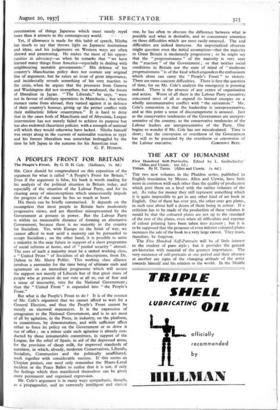A PEOPLE'S FRONT FOR BRITAIN
The People's Front, By G. D. H. Cole. (Gollatica, 7s. 6ci.) MR. COLE should be congratulated on this exposition of the argument for what is called " A People's Front for Britain." Even if the argument is false, his book is worth reading for his analysis of the political situation in Britain today, and especially of the situation of the Labour Party, and for its clearing away of misconceptions which unnecessarily impede the progress of the cause he has so much at heart.
His thesis can be briefly summarised. It depends on the assumption that most people in Britain have moderately progressive views, and are therefore misrepresented by the Government at present in power. But the Labour Party is within no measurable distance of forming an alternative Government, because there is no majority in the country for Socialism. Yet, with Europe on the brink of war, we cannot afford to wait until a majority cad be persuaded to accept Socialism ; on the other hand, it is possible to unite a majority iii the near future in support of a short progranixne of social reforms at home, and of " pooled security " abroad. The core of 'such a' majority must be a united working class, a " United Front " of Socialists of all descriptions, from Dr, Dalton to Mr. Harry Pollitt. This working' class alliance involves a surrender for the time being of ultimate ends and agreement on an immediate programme which will secure the support not merely of Liberals but of that great mass of people who at present do not vote at all or, out of fear and a sense of insecurity, vote for the National Government ; thus the " United Front " is expanded into " the People's Frotit."
But what is the People's Front to do ? It is of the essence of Mr. Cole's argument that we cannot afford to wait for a General Election, and thus the People's Front cannot be merely an electoral manoeuvre. It is the expression of antagonism to the National Government, and is to act most of all by agitation, in the Press, in industry, on the platform, in committees, by demonstration, and with sufficient effect either to force its policy on the Government or to drive it out of office ; on a minor scale such agitation is already con- ducted by those innumerable committees, in support of the League, for the relief of Spain, in aid of the depressed areas, for the provision of cheap milk, for improved standards of nutrition, in which, already, moderate Conservatives, Liberals, Socialists, Communists and the politically unaffiliated, work together with considerable success.. If this seems an Utopian project, one need only remember the Hoare-Laval incident or the Peace Ballot to realise that it is not, if only the feelings which then manifeited themselves can be given more permanent and organised expression. Mr. Cole's argument is in many ways sympathetic, fhoUgh, as a "piotragandist, and 'an • extremely intelligent' and sincere one, he has often to obscure the difference between what is' possible and what is desirable, and to concentrate attention on those difficulties which are most easily removed. The real- difficulties are indeed immense. An unprejudiced observer might question even the initial assumption—that the majority in Great Britain is moderately progressive ; or he might say that the " progressiveness " of the majority is very near the " reaction " of the Government ; or that neither social. conditions in Britain nor the state of mind of " moderate progressiveness " is of the kind which engenders the enthusiasm which alone can carry the " People's Front " to victory. There are more concrete difficulties. There is first the question of time, for on Mr. Cole's analysis the emergency is pressing indeed. There is the absence of any centre of organisation and action. Worst of all there is the Labour Party executive, concerned most of all to expend its limited energies on a wholly unremunerative conflict with "the extremists." Mr. Cole's contention is that the leadership is unrepresentative; and at this point a sense of discouragement is aroused. Just as the conservative tendencies of the Government are unrepre- sentative of the country, so the conservative tendencies of the Labour leaders are unrepresentative of the Party. One begins to wonder if Mr. Cole has not miscalculated. Time is short; but the conversion or overthrow of the Government has still to be preceded by the overthrow or conversion of






































 Previous page
Previous page